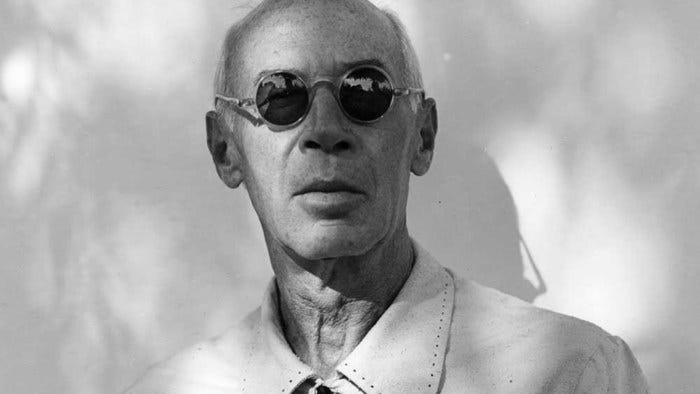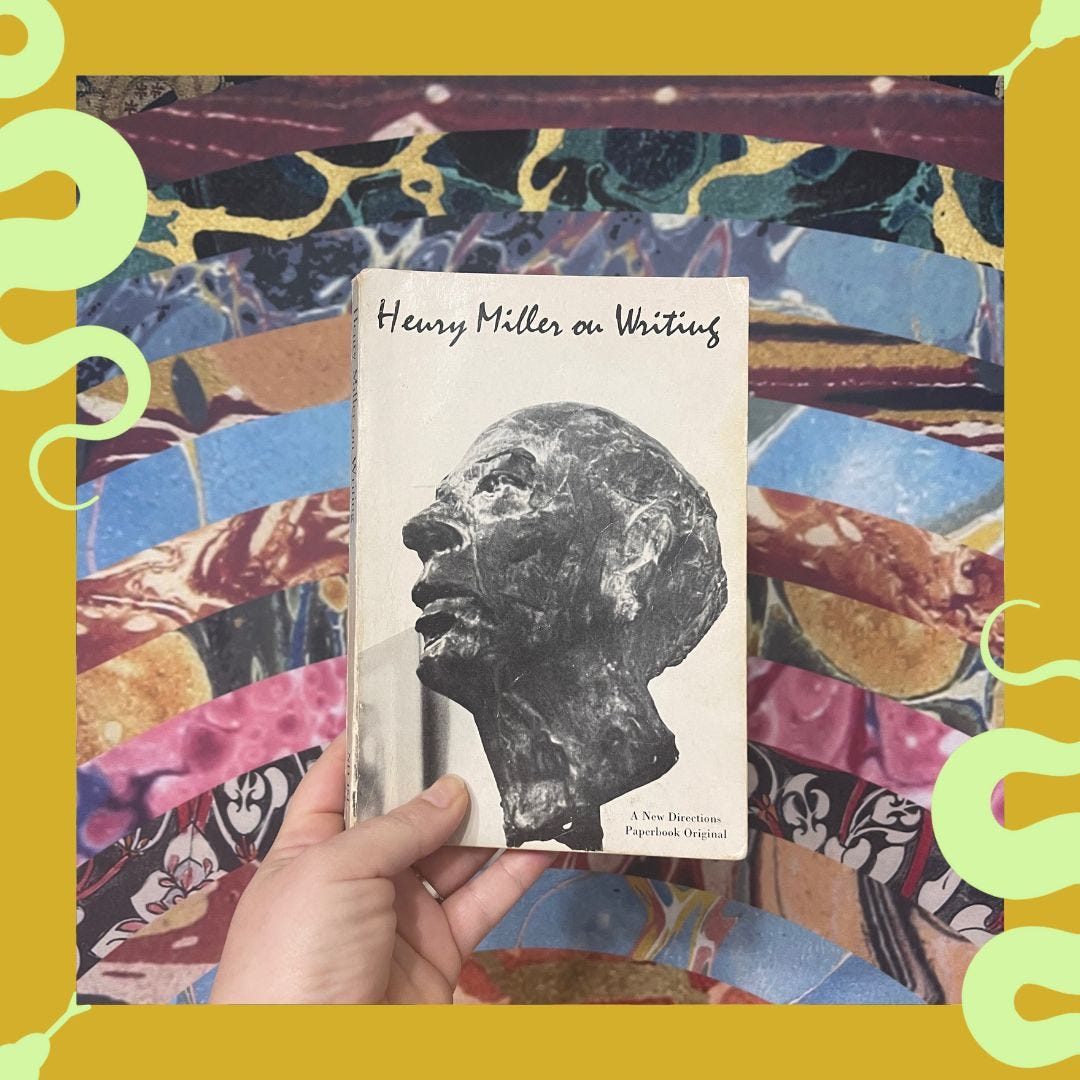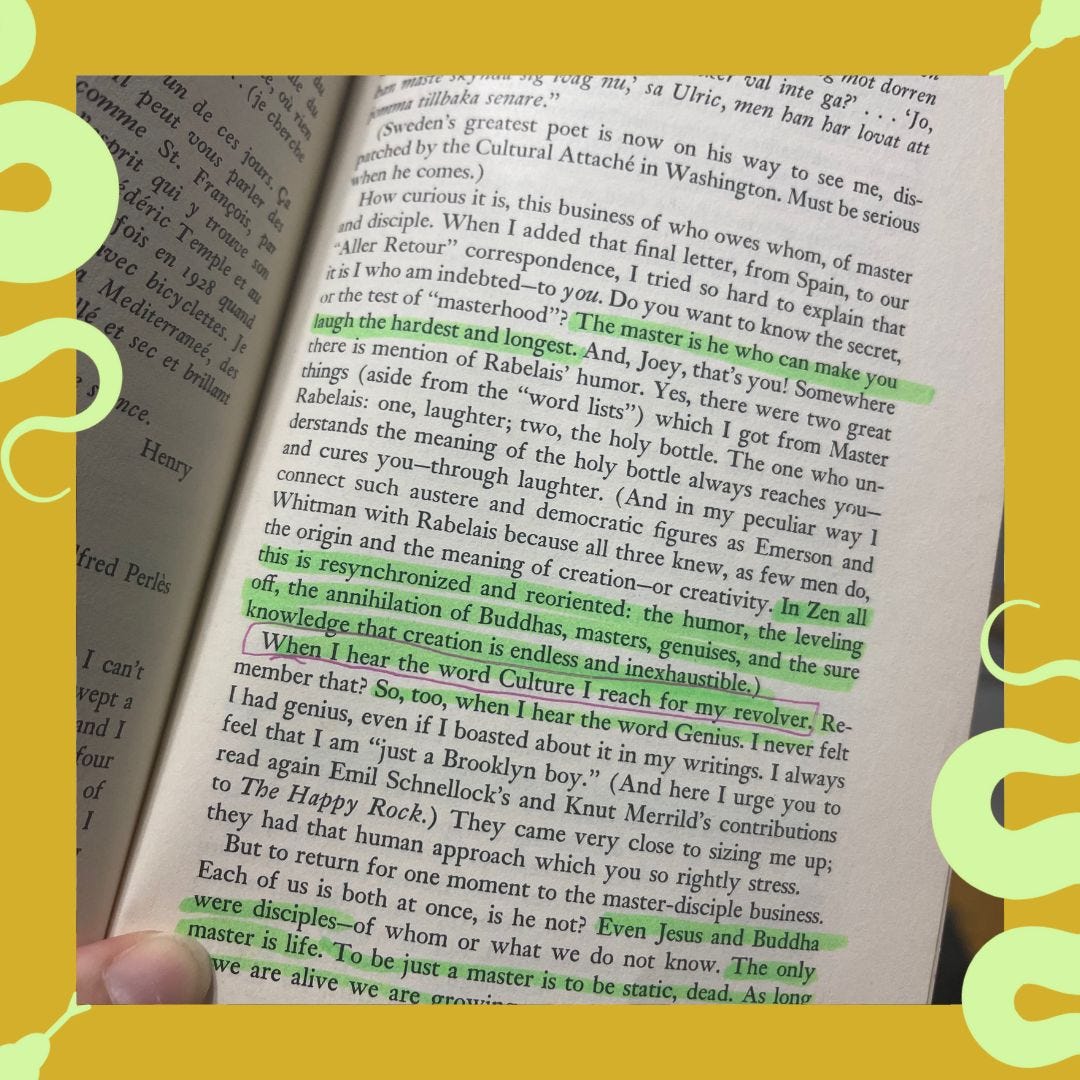The Habits of Henry Miller
Henry Miller's 10 Commandments of Writing and Why You Should Read Taboo Books
Do you read “canceled” or once-banned writers?
I do. Why?
As Henry Miller writes:
“Censorship works like a boomerang.”
And
“Adults need obscene literature, as much as children need fairy tales, as a relief from the oppressive forces of convention.”
And
“The offender who stands before the court is not being tried by his peers, but by his dead ancestors.”
In fact, so much of Henry Miller’s once-banned work circulates on why you SHOULD do what culture tells you NOT to do that it’s hard to pick only one quote on this topic.
“When I hear the word Culture I reach for my revolver.”
— Henry Miller in a letter to Aldred Perlés.
Miller asserts again and again that culture should be inspected, that normality assumes a protective quality, but from surface deception, we pass to inner deception, and this inner deception is the work of the writer to reveal and unravel.

“The more I wrote, the more I became a human being.”
— Henry Miller, Letter from Henry Miller to Alfred és.
My fascination with Henry Miller began in high school when my parents took me from rural western Virginia to visit cousins in the bay area of California. One morning, unable to sleep due to jetlag, I slipped a copy of The Tropic of Capricorn off the shelf and snuggled with it in my room under the covers. It engrossed me, and I’ve been a fan ever since. He was a pioneer in the genre of “Dirty Realism,”—gritty, realistic writing, with sex and disgust and violence and lust and love.
“Everything I write is loaded with dynamite that will one day destroy the barriers erected about me.” — Henry Miller, The Cosmological Eye.
Born in NYC in 1891, Miller spent his early years in poverty and struggled to make ends meet. He worked a variety of odd jobs, from selling shoes to operating a hot dog cart. It wasn’t until he moved to Paris in the 1920s and adopted the below “Program,” that his writing career took off.
Miller’s Program and Commandments of Writing
I’ve extracted and lightly condensed Miller’s writing advice/habits from one of my all-time favorite writing craft books, Henry Miller On Writing, edited by Thomas H. Moore.
Henry Miller's 10 Commandments of Writing
Work on one thing at a time until finished.
Start no more new books. (This should be read in tandem with rule 1. Work on one thing until finished.)
Don't be nervous. Work calmly, joyously, recklessly on whatever is in hand.
Work according to Program (see below), and not according to mood. Stop at the appointed time.
When you can't create, you can work.
Cement a little every day, rather than add new fertilizers.
Keep human! See people, go places, drink if you feel like it!
Don't be a draught-horse! Work with pleasure only.
Discard the Program when you feel like it—but go back to it the next day. Concentrate. Narrow down. Exclude.
Forget the books you want to write. Think only of the book you are writing.
Write first and always. Painting, music, friends, cinema, all these come afterwards.
Henry Miller's “Program”
Mornings:
If groggy, type notes and allocate, as stimulus.
If in fine fettle, write.
Afternoons:
Work on section in hand, following plan of section scrupulously. No intrusions, no diversions. Finish one section at a time, for good and all.
Evenings:
See friends. Read in cafes.
Explore unfamiliar sections—on foot if wet, on bicycle, if dry.
Write, if in mood, but only on Minor Program.
Paint if empty or tired.
Make notes. Make charts, Plans. Make corrections of manuscript.
**Note: Allow sufficient time during daylight to make an occasional visit to museums or an occasional sketch or an occasional bike ride. Sketch in cafes and trains and streets. Cut the movies! Library for references once a week.
Miller would also sometimes designate “Major Programs” and “Minor Programs,” which were essentially to-do lists on the same project, but sorted into tasks done at peak productivity times of the day, and less mentally sharp times of the day, but still all focused on his primary work.
Later, in a 1961 interview with the Paris Review, Miller said in response to his writing schedule:
“I prefer the morning now, and just for two or three hours. In the beginning, I used to work after midnight until dawn, but that was in the very beginning. Even after I got to Paris I found it was much better working in the morning. But then I used to work long hours. I’d work in the morning, take a nap after lunch, get up and write again, sometimes write until midnight. In the last ten or fifteen years, I’ve found that it isn’t necessary to work that much. It’s bad, in fact. You drain the reservoir.”
How Does This Land?
“Every page must explode.” — Henry Miller, Tropic of Capricorn.
Do you engage in any of these habits? Would Miller’s schedule work for you? What is your program?
I love reading about the habits of writers and other thinkers, and Miller’s lifestyle is one that always resonated with me. To me, a night owl who also loves the pleasures of the body, good food, new cities, travel, sometimes too much wine, art, and books, this sounds like the dream life.
“My purpose [as a writer] was to impart such a finish, such a patina, that every page would gleam like stardust.” — Henry Miller, Nexus.
Want more?
Watch these fascinating 47 minutes of Henry Miller, “The High Priest of Obscenity,” which someone on Youtube compiled.
Or, want to read more about my writer heroes? Read or listen to my three-part series on Zadie Smith:







Amazing recommendation! I love the rebellious spirit of Miller and his unconventional suggestions. Thank you, I’m gonna get this book!
Very cool; thanks